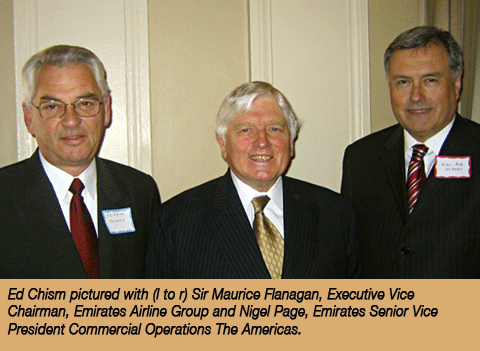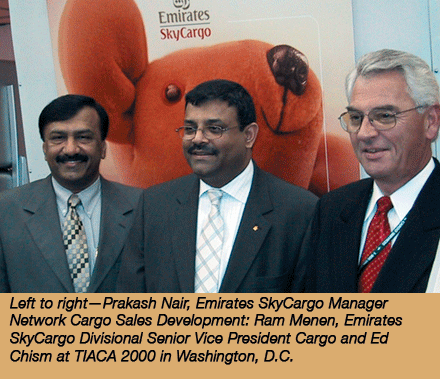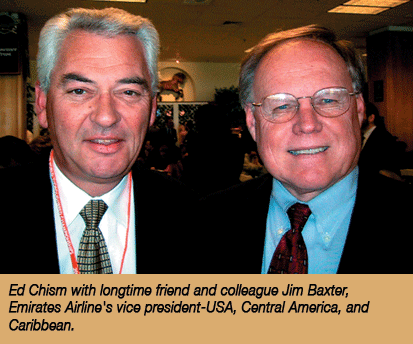| 
 |
Every once in a lifetime (or in my
racket, if you are really lucky, a couple of times), you get to talk
to somebody who truly lights up the room.
It is Ed Chism’s presentation,
experience, wisdom, positive point of view, and cutting right to the
chase that sets this air cargo executive apart.
Ed has been in the cargo business since
Lyndon Johnson was U.S. President and apparently has loved every minute
of it, which made my recent talk with him in New York such a great
experience.
Now that I think about it, later this
month another talk I had with KLM’s Jacques Ancher will run
in these pages, and not for the first time.
Air cargo has some really interesting
individuals, both men and women, for which it should be thankful.
It is our intention to try and talk
to every single one of them.
 Today
in air cargo, nobody is flying higher than Emirates SkyCargo. Today
in air cargo, nobody is flying higher than Emirates SkyCargo.
While we write quite a bit about Emirates,
its people, and the places and developments of the airline, it’s
safe to say that the EK SkyCargo story and product rarely (if ever)
disappoint.
We spent a very good afternoon recently
with SkyCargo’s point man in America, Ed Chism.
Ed is Cargo Manager North America and
is also old-school air cargo, meaning he has been humping and moving
freight around the world since he was 19 years old. Now some 43-plus
years later, he has managed to keep abreast of industry developments
and finds himself where he always was, out front and leading the way
whilst delivering valuable air cargo revenue to a great international
airline from his base in New York City.
Sometimes the sweet story can be as exciting and memorable as any
other.
Ed Chism drives up in a sleek, low-slung
BMW, an Emirates car that looks like something out of the movie The
Transporter; a motor that appears to be in motion even while parked
and sitting perfectly still.
We meet in a small Italian seafood restaurant
over on Cross Bay Boulevard near JFK International in Howard Beach,
just down the road from Russo’s where all the airport cargo
events are held.
The place is called Vincent’s
and not only is this venue a genuine joint and one of the best places
anywhere, the restaurant is also near the social club once populated
by the likes of John Gotti and Henry Hill, the infamous mob stooge
and subject of director Martin Scorsese’s Goodfellas.
Goodfellas, among other things, tells
of the Lufthansa Cargo heist at JFK during a time when air cargo at
the big airport was considered a personal shopping mall for neighborhood
gangsters.
But Ed and I were younger at the time,
and while I was chasing copy and pushing deadlines for our original
air cargo newspaper Air Cargo News, Ed Chism was well on his way to
building a career after beginning as a mere lad at legendary Pan American
Airways Clipper Cargo.
Today with my tape recorder in hand
(which is turned off when we really talk) we lose no time getting
down to cases.
 “Pan
Am was there at the beginning of so many things important to aviation
and air cargo. “Pan
Am was there at the beginning of so many things important to aviation
and air cargo.
“But Emirates picked up the flag
of forward thinking and innovation on the first day in business and
has never backed down a bit since 1985.
“My view is that our DVSP Ram
Menen is both a global leader in the business and also a visionary
in air cargo.”
Those words from Ed, who worked with
many of the legendary leaders of air cargo, bear some further consideration.
Ed worked with Bill Boesch, Thor Johnson
and a host of others at Pan Am and around the world. He rose from
an entry clerk at PAA to waking up one day and having the rather sad
and thankless task of closing down Pam Am Clipper Cargo altogether
at Building 67, JFK, when the great airline was finally grounded forever
in December 1991.
“I was always fascinated with
airplanes and the airlines.
“A friend of mine worked for American
Airlines so I asked him if there were any jobs at AA and he said no,
but that he heard that Pan Am was hiring.
“So at 19 I went to JFK PAA Hangar
14, put in an application and they asked me if I could type and I
replied:
“‘Sort of.’
“They told me there were some
openings in cargo and although I wasn’t much interested in the
field, I indicated interest, figuring that was a good way to get my
foot in the door.
“Air cargo is where I started
and stayed for the past 43 years.
“I worked for Pan Am for 25 years.
“I had actually started in Building
67 the week it opened, driving a forklift in Import on the midnight
shift with Tuesdays and Wednesdays off.
“We were not automated much at
the time except for the Flow Access System, which was basically the
first FedEx system several decades before that company went into business.
“Building 67 was designed for
B707s so most cargo were small packages.
 “The
system was not perfected, and when the B747s came on, we ripped it
out so that we could build up containers and pallets and other unitized
freight. “The
system was not perfected, and when the B747s came on, we ripped it
out so that we could build up containers and pallets and other unitized
freight.
“I did all the jobs and finally
worked in a satellite unit in the passenger terminal that coordinated
the freight on and off the flights as my first management experience.
“Later as a supervisor and a duty
manager in both import & export, I moved up to director of ramp
operations at a time when JFK International was Pan Am hub for six
B747 freighters.
“At that point I was in charge
of postal activities, cargo ramp, and also coordinating freight, both
passenger and all cargo.
“When in the mid 1980s Clipper
Cargo headquarters moved from Manhattan to Building 67, my job under
Thor Johnson was worldwide director of sales and services, where I
served until the airline shut down.
“Looking back, I learned everything
at Pan Am.
“From documentation to U.S. Customs
to all the regulatory authority requirements to security, you did
it all—you had to do it all and that was it.
“I guess my entrepreneurial spirit
was greatly helped along by that experience because just after the
airline went out of business, I declined to join Pan Am II, preferring
to open my GSA company at JFK International off airport in Springfield
Gardens.
“We had several companies that
we conducted various tasks for, including consulting, but Emirates
was among our first accounts, and eventually Emirates grew into our
biggest.
“Our association began with a
presentation for Ram Menen, which he accepted.
“In 1993, Emirates began booking
air cargo in USA; as an offline carrier we had zero revenue as we
began moving freight via interline partners from New York to Emirates’
London flights.
“As my GSA company expanded, we
set up two Emirates freighter flights weekly from JFK to Dubai.
“Initially the freighter flights
grew nicely in the scheme of things, as those flights were always
full and continued up until Emirates began flying into New York from
Dubai non-stop.
“Today with direct service to
Dubai from a growing list of gateways, we continue to build; Emirates
SkyCargo is a 100 million dollar business in USA and growing.”
It turns out that Ed Chism, counting
his nearly 12 years as SkyCargo GSA and the past eight as a full time
employee of the Emirates, has been associated with the carrier for
nearly 20 years, matching his Pan Am experience as not only the person
in the right place at the right time but also as an air cargo executive
in many ways responsible for Emirates’ great success in the
USA market.
But there is not an ounce of doubt or
a moment of hesitation as Ed declares:
“Emirates is truly a great airline.
“If you want to draw comparisons
between Emirates and Pan Am there is no comparison from an air cargo
viewpoint.
 “Emirates
SkyCargo is far superior to anything Pan Am Clipper Cargo did or hoped
to become, even in its heyday. “Emirates
SkyCargo is far superior to anything Pan Am Clipper Cargo did or hoped
to become, even in its heyday.
“The team is just great, headed
up by Ram who is both a visionary and a great leader.
“Ram Menen knows where he wants
to bring the airline in air cargo and beyond; he has a very clear
vision of where the entire industry needs to be moving ahead in the
21st century.
“He is truly unique in the world
right now when it comes to air cargo.
“We all are lucky that he is on
the global scene the way he is, pushing for air cargo change and advancement
in every aspect of the business, from e-freight to warehousing to
security, you name it.
“Of course, underpinning his effort
and legacy is his work in building SkyCargo, which will stand the
test of time.
“The big challenge ahead is about
the same as before, and that is getting forwarders and governments
to endorse and practice utilizing paperless air cargo or e-freight.
“Here, America is a good example
of the problem of putting e-freight into practice.
“In some cities you can do paperless
business with exports, but not imports.
“In other cities it can be the
other way around, while in yet other USA destinations it can be all
shipments or worse—not allowing e-freight as part of the supply
chain process at all.
“Everybody knows that for real
change, there has to be a collaborative effort across the board, but
no one seems to know how and when that will happen.”
You listen to Ed Chism talk and realize
that rarely (or maybe even never) has this highly intelligent and
wizened air cargo professional come off the line of moving air cargo,
to tell it like it is and express these feelings.
Ed is all about business.
Ed Chism loves to move air cargo, and
although we learned that he was off on a family holiday after our
meeting, we could feel that even then he was looking forward to getting
back, to take charge as Emirates expands operations vigorously across
the USA to new destinations, including Washington, D.C. coming this
fall and most probably Atlanta and Chicago sometime shortly after
that.
Often during our afternoon together,
Ed would say:
“C’mon, let’s go outside
and have a smoke.”
Without a word we would stand outside
the small restaurant and Ed would continue the conversation, cigarette
in hand.
It made me think of all the years everybody
just smoked in business meetings with several cups of coffee, and
how unusual it was that anybody was still smoking in 2012.
But at one break, our waitress followed
us outside and lit up a cigarette with us.
So there we were, two smokers and one
non, and I wondered aloud why not just put a table outside?
“The USPS is moving to cooperate
with UPU and ICAO to try and standardize some electronic rules and
procedures,” Ed said, as aircraft overhead moved in from the
Atlantic on a long aerial pathway that would take them to final just
above Ed’s old Building 67, a route the pilots call “The
Canarsie Run” after the Brooklyn neighborhood just below the
approach.
“Let’s face it,” Ed
said, “change, whatever the need, comes very slowly to air cargo.
Aside from some information technology driven by the Internet and
newer handling systems that have come on line during the past twenty
years, the air cargo business has not changed all that much over time.
“You still make out airwaybills,
do consolidations, and then book the cargo on a flight.
“Pallets are still built and airplanes
are still loaded as they always were in air cargo.”
Today, Emirates SkyCargo serves six
USA destinations and (falling under one of Ed Chism’s responsibilities)
has a GSA working cargo in Mexico for the carrier.
In addition to double dailies to Dubai
from JFK, EK has a block space agreement via Liege to Dubai with TNT
that moves an additional 250 tons a week, trucked into the airport
from Chicago and elsewhere.
“The new flights have been well
utilized and we are looking forward to Washington (Dulles) coming
in September with daily flights (B777s) into Dubai—that will
help us accommodate Washington, Baltimore, Charlotte, Atlanta and
more.
“My thought is that eventually
we might go to increased freighter destinations in USA as the market
further develops.
“But we don’t want to be
bigger or broader-based just for the sake of size—our mission
is superior service and unusual customer relationships driven by the
brilliance of our people and the Emirates Mega Hub in Dubai.”
We said goodbye to Ed Chism with some
promises to get together again sometime.
Now a few weeks later, through that
conversation with Ed I can recall a time when New York was the center
of the universe for some truly great air cargo executives who served
the famous international flag airlines and freight forwarders, during
an era when the top USA gateway was here—the jewel in the crown
of any international air cargo business.
These few dozen people in various positions,
from the top to the bottom, seated in offices on and around JFK International
Airport, changed history over decades, and (among other achievements)
gave birth to industry groups like CNS and TIACA to create much of
what we know today as organized air cargo.
There is still some of that breed out
there among us, like Ed Chism and others, who still report daily to
JFK, and that is a great comfort to me.
In Ed’s case, he has come all
the way back to once again be a major air cargo force at one of the
greatest airlines in the world.
In air cargo, Ed Chism has already lived
twice.
Geoffrey/Flossie |




